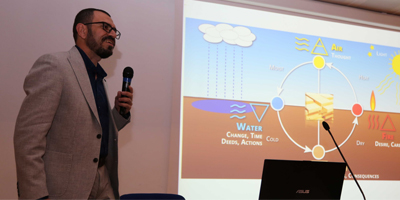While the world’s population is constantly growing, fertile soils are declining rapidly

Approximately 1,000 years is required for 2-3 cm soil formation
European University of Lefke (EUL) Centre of Social and Cultural Activities and Environment Club organized a seminar themed “World Soil Day”. Academician of EUL Agricultural Sciences and Technologies Faculty Assist. Prof. Dr. İbrahim Kahramanoğlu attended the seminar as a speaker.
Stop the erosion save the future
In the seminar, Kahramanoğlu informed the students about soil deterioration, soil erosion, aridification, salinization and soil pollution, and the importance of soil and the things to be done for the protection of the soil. Pointing out that soil consists of a combination of air, water, mineral substances and organic substances, Kahramanoğlu said that the soil is a living being and that an average of 500 billion bacteria live on 1 g soil. In his presentation, Kahramanoğlu also emphasized that the theme that United Nations determined for 2019 is “Stop the erosion and save the future” and added that “Since the beginning of 2019, the world’s population has increased by approximately 75 million and at the same time 65 million decares of soil have been eroded by erosion. In other words, while the world population is constantly increasing, fertile soil is rapidly decreasing. Research shows that it takes 1,000 years for 2-3 cm soil formation. The soil area lost only by erosion in 2019 has the capacity to produce 1.5 times the total tomato need of the world. In summary, farmers have to feed more people by producing more in less areas. This requires high technology, excessive input, fertilization and irrigation, which are among the causes of erosion. Trapped in this vicious circle, human beings must act jointly for future generations and preserve both land and other natural resources”.
At the end of the presentation, Kahramanoğlu briefly talked about what can be done to prevent erosion in agricultural areas and listed these preventions as follows;
- Agricultural lands should be evaluated according to ability classes and plants should be grown in suitable soils.
- Non-agricultural forest areas and pastures should be protected and green areas should be increased. Pastures should not be over-grazed.
- By alternating crops, the pressure on the soil can be reduced, as well as the condensation of diseases and pests.
- Terraces should be made where the slope is steep. Tillage should be perpendicular to the slope.
- Surroundings of rivers and dams should be afforested.
- Soil erosion should be prevented by producing the products that do not interact with each other.
- Wind-blocking trees should be planted in the fields where the winds are strong.
- Garden and field waste should not be burned.
